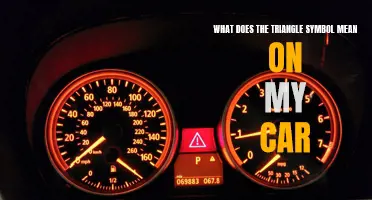
Have you ever wondered what that little battery symbol with arrows going in a circle means? You've probably seen it on various electronics and household items, but what does it actually signify? Well, that symbol is known as the recycle symbol and it indicates that the item contains a battery that should be recycled instead of thrown in the regular trash. In today's environmentally conscious world, understanding the meaning behind this symbol is crucial in order to properly dispose of our electronic waste. So let's dive in and explore the significance of the battery with the recycle symbol!
What You'll Learn

What does the symbol of a battery with a recycling logo mean?
The symbol of a battery with a recycling logo can have different meanings depending on the context. In general, it represents that the battery can and should be recycled instead of being thrown away as regular trash. This symbol is important because batteries can contain toxic materials such as lead, cadmium, and mercury, which can harm the environment if they end up in landfills.
When you see the battery recycling symbol, it indicates that the battery is designed for recycling and that there are systems in place to collect and recycle these batteries safely. The symbol serves as a reminder to consumers that they have a responsibility to properly dispose of their batteries to minimize environmental damage.
In many countries, batteries are classified as hazardous waste, and regulations have been put in place to ensure their proper handling and disposal. Recycling batteries helps to recover valuable materials like nickel, lithium, and cobalt, which can be reused in the production of new batteries or other products.
To recycle batteries, it is recommended to take them to designated battery recycling centers or drop-off locations. These facilities have the means to handle and recycle batteries safely, preventing the release of toxic substances into the environment. In some cases, manufacturers or retailers may also have take-back programs where you can return your used batteries for recycling.
It is essential to note that not all batteries can be recycled. The battery recycling symbol is typically found on rechargeable batteries, such as those used in laptops, smartphones, and power tools. These batteries are commonly made of materials like nickel-cadmium (NiCd), nickel-metal hydride (NiMH), and lithium-ion (Li-ion), which are all recyclable.
On the other hand, single-use or disposable batteries, such as alkaline batteries commonly used in remote controls and clocks, usually do not have a recycling logo. These disposable batteries contain fewer valuable materials and are generally not recycled. However, they should still be disposed of properly and not tossed into the regular trash.
In conclusion, the symbol of a battery with a recycling logo signifies that the battery is designed to be recycled and should not be thrown away in regular trash. Recycling batteries helps to protect the environment by preventing the release of hazardous materials. It is important to take rechargeable batteries to designated recycling centers or drop-off locations for proper recycling, while disposable batteries should be disposed of correctly. By responsibly recycling batteries, we can contribute to a sustainable future and reduce the environmental impact of these commonly used energy sources.
Unraveling the Mysteries of Hawaiian Petroglyphs: Symbols and Their Profound Meanings
You may want to see also

How can I properly dispose of a battery with a recycling symbol?
When it comes to properly disposing of a battery with a recycling symbol, it's important to handle it with care to protect the environment and ensure the safety of those handling the disposal process. Here are some steps you can take to properly dispose of a battery with a recycling symbol:
- Check the battery type: Determine the type of battery you want to dispose of. Common types include alkaline, rechargeable (including lithium-ion), and button cell batteries. Each type may require different handling procedures, so it's essential to know what you're dealing with.
- Store batteries safely: In the meantime, while waiting to dispose of the batteries, make sure to store them in a dry and cool place. Avoid storing them near flammable materials or in direct sunlight, as this can increase the risk of a fire.
- Research local recycling options: Contact your local recycling center or check their website to find out if they accept batteries. Many recycling centers have designated drop-off points specifically for batteries.
- Prepare batteries for recycling: If possible, tape over the battery terminals with clear tape to prevent any accidental contact that could lead to a fire hazard. This step is especially crucial for rechargeable batteries, which can still have a charge even when they are no longer functional.
- Recycle batteries properly: Once you have found a recycling center that accepts batteries, follow their specific guidelines for storing and transporting the batteries. Some centers may require you to place the batteries in a designated container or bag, while others may have specific drop-off hours.
- Consider alternative disposal options: In some cases, you may not have access to a local recycling center that accepts batteries. In such situations, you can explore alternative options such as local electronics stores or government-sponsored collection events that accept batteries for proper disposal.
- Educate yourself on local regulations: Recycling regulations can vary by region, so it's essential to familiarize yourself with the specific guidelines in your area. Some states or countries may have stricter regulations on battery disposal, requiring specialized handling or disposal methods.
Remember, it's crucial to dispose of batteries properly to prevent soil and water contamination, as well as the release of toxic chemicals into the environment. By following these steps, you can do your part in responsibly disposing of batteries and protecting both human health and the environment.
The Symbolic Death Meaning: Understanding the Deeper Significance Behind the Final Transition
You may want to see also

Why is it important to recycle batteries?
In today's digital age, batteries have become an essential part of our lives. From powering our smartphones and laptops to providing energy for electric vehicles, batteries play a vital role in our day-to-day activities. However, the improper disposal of batteries can have severe consequences for the environment and human health. That is why recycling batteries is incredibly important.
Firstly, batteries contain hazardous materials that can be harmful to both humans and the environment. Many batteries, such as alkaline and nickel-cadmium batteries, contain heavy metals like lead, mercury, and cadmium. These metals are toxic and can leach into the soil and water if batteries are not disposed of properly. When these hazardous materials enter the environment, they can contaminate water sources and pose a threat to the ecosystem and human health.
Recycling batteries allows for the safe extraction and disposal of these hazardous materials. By recycling batteries instead of throwing them away, we can prevent these toxic substances from entering landfills and potentially causing pollution. Recycling facilities have specialized processes to safely extract and handle the hazardous materials found in batteries. This reduces the risks associated with improper disposal and ensures that these materials are properly managed and reused.
Secondly, recycling batteries helps conserve valuable resources. Batteries contain valuable metals like lithium, cobalt, and nickel, which are all finite resources. By recycling batteries, these metals can be extracted and reused in the production of new batteries or other electronic devices. When we recycle batteries, we reduce the need for mining and extracting virgin resources, which not only conserves these valuable materials but also reduces the environmental impact of resource extraction.
Lastly, recycling batteries helps reduce energy consumption and greenhouse gas emissions. The process of mining and refining virgin resources requires a significant amount of energy, which leads to the emission of greenhouse gases. By recycling batteries and reusing the extracted metals, we can reduce the energy demand and associated carbon emissions from the production of new batteries.
In conclusion, recycling batteries is crucial for several reasons. It helps protect the environment and human health by preventing the release of hazardous materials into the ecosystem. It also conserves valuable resources and reduces energy consumption and greenhouse gas emissions. As more and more batteries are being used worldwide, it is vital to promote and encourage battery recycling to mitigate the negative impacts of improper disposal and ensure a sustainable future.
Decoding the Volvo Dashboard Symbols: What Do They Really Mean?
You may want to see also

Are all types of batteries recyclable?
Batteries play an essential role in our daily lives, powering the devices and gadgets we rely on. However, once they reach the end of their life, it's crucial to dispose of them properly to minimize their environmental impact. Recycling batteries is an effective way to recover valuable materials and prevent them from ending up in landfills. While recycling is generally encouraged, it's important to note that not all types of batteries can be recycled in the same way.
There are various types of batteries commonly used, including alkaline, lithium-ion, lead-acid, nickel-cadmium, and nickel-metal hydride batteries. Each type has its own recycling process and requirements, and not all are readily recyclable.
Alkaline batteries, often used in household items like remote controls, toys, and flashlights, can usually be safely disposed of in regular trash. Some recycling centers may accept them, but their recycling process is not as common as that of other types of batteries.
In contrast, lithium-ion batteries, commonly found in smartphones, laptops, and electric vehicles, are highly recyclable and should not be thrown in the trash. These batteries contain valuable materials like cobalt, nickel, and lithium, which can be extracted and reused. Many electronic stores and recycling centers have programs for collecting lithium-ion batteries for recycling.
Lead-acid batteries, commonly used in vehicles, are also highly recyclable. These batteries contain lead, a highly toxic material that can be hazardous if not properly disposed of. Recycling lead-acid batteries ensures the safe recovery of lead and prevents its release into the environment. Many automotive shops and recycling centers accept lead-acid batteries for recycling.
Nickel-cadmium (NiCd) batteries and nickel-metal hydride (NiMH) batteries are often used in portable electronics and power tools. These batteries contain heavy metals like cadmium and nickel, which can be harmful to the environment if not properly disposed of. Many electronics manufacturers and recycling centers have collection programs for recycling these types of batteries responsibly.
It's important to note that the recycling process for batteries can vary depending on the recycling facility and local regulations. Some batteries may require special handling due to their hazardous nature. Therefore, it's always recommended to check with local recycling centers or waste management facilities to determine the proper disposal method for specific types of batteries.
In conclusion, not all types of batteries are recyclable in the same way. While some batteries like lithium-ion and lead-acid batteries are highly recyclable, others like alkaline batteries may not have as readily available recycling options. It's essential to understand the recycling processes and requirements for different battery types to ensure they are disposed of properly and their valuable materials are recovered. By recycling batteries responsibly, we can minimize our environmental impact and contribute to a more sustainable future.
Understanding Mitsubishi Mirage Dashboard Symbols and Their Meanings
You may want to see also

Where can I find battery recycling centers near me?
Battery Recycling Centers Near Me
Battery recycling is important for both environmental and safety reasons. Batteries contain hazardous materials such as lead, mercury, and cadmium, which can contaminate the soil and water if not disposed of correctly. Recycling batteries also helps conserve valuable resources, as the materials they contain can be reused in the production of new batteries.
If you're wondering where to find battery recycling centers near you, here are some options to consider:
Retailers and Electronic Stores:
Many retailers and electronic stores have battery recycling programs in place. The following stores often accept batteries for recycling:
- Best Buy: Best Buy stores have recycling kiosks where you can drop off your old batteries.
- Home Depot: Home Depot accepts rechargeable batteries for recycling at their stores.
- Staples: Staples also offers battery recycling services at their locations.
Municipal Recycling Centers:
Most cities and municipalities have recycling centers that accept batteries. These centers are typically funded by local government and often accept a wide range of recyclable materials, including batteries. Check your city or county's website for information on recycling locations and accepted materials.
Earth911:
Earth911 is an online directory that helps you find recycling centers near you. Their website has a search feature where you can enter your location and the type of item you want to recycle (in this case, batteries), and it will provide a list of nearby recycling facilities.
Call2Recycle:
Call2Recycle is a national battery recycling program in the United States and Canada. They have a drop-off location finder on their website, where you can search for battery recycling centers near you. They accept rechargeable batteries, as well as cell phones and other electronics.
Local Hazardous Waste Collection Facilities:
Some cities have dedicated hazardous waste collection facilities that accept batteries and other hazardous materials. These facilities are designed to safely handle and dispose of hazardous waste, including batteries. Check with your local waste management agency or environmental agency for information on hazardous waste collection facilities in your area.
Remember, not all batteries can be recycled in the same way. While most rechargeable batteries can be recycled, single-use alkaline batteries (such as AA or AAA batteries) can usually be safely disposed of in the regular trash. However, it's always a good idea to check with your local recycling center or waste management agency for specific guidelines on battery disposal in your area.
In conclusion, there are several places where you can find battery recycling centers near you. Retailers and electronic stores often have recycling programs, while municipal recycling centers, Earth911, Call2Recycle, and local hazardous waste collection facilities are other options. Proper battery recycling helps protect the environment and conserve valuable resources, so be sure to take advantage of these services and dispose of your batteries responsibly.
Understanding the Symbols on a Verona Oven: A Guide to Unraveling their Meaning
You may want to see also
Frequently asked questions
The battery with the recycle symbol indicates that the battery is recyclable and should not be thrown in the regular trash.
Not all types of batteries can be recycled. While common household batteries like alkaline and zinc-carbon batteries can be recycled, other types like lithium-ion batteries need special recycling processes.
Batteries with the recycle symbol should be taken to a designated recycling center or a drop-off location that accepts batteries for recycling. Do not throw them in the regular trash as they can harm the environment.
Recycling batteries is important because they contain hazardous materials like heavy metals that can leach into the soil and water if not properly disposed of. By recycling them, these materials can be safely extracted and reused.
In some cases, batteries with the recycle symbol can be recharged and reused. However, this depends on the type and condition of the battery. It is always best to check the manufacturer's instructions or consult a professional before attempting to reuse a battery.







